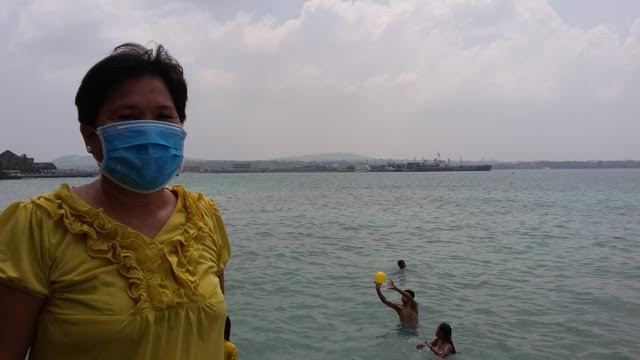Prices of N95 masks double as Indonesian haze blankets Cebu

A woman in Bohol wears a face mask as protection from the haze. Photo by Leo Udtohan, Inquirer Visayas
CEBU CITY—The prices of N95 face masks have doubled due to a high demand following reports of hazardous haze and dust particles over Metro Cebu.
N95 masks now cost P105 each from P55, said Councilor Dave Tumulak, chair of the Cebu City Disaster Risk Reduction and Management Council.
There was also a reported shortage of supply of the face masks and hoarding by suppliers to jack up the prices, he added.
“I told the Office of the Civil Defense about this so the OCD would inform the Department of Trade and Industry to control the prices of the N95 masks,” Tumulak said.
Environment officials earlier urged residents to wear protected masks due to the dust particles in the air that were beyond normal because of the haze triggered by the forest fires in Indonesia and pollution in Metro Cebu.
Article continues after this advertisementBut on Monday, the Department of Environment and Natural Resources (DENR) said the dust particles in Metro Cebu’s air had gone down although the public must continue to protect themselves.
Article continues after this advertisementBased on the ambient air quality monitoring as of Monday morning, the dust particles, or particulate matter (PM), measuring 2.5 micrometers in diameter reached 34 micrograms per cubic meter, below the limit of 75 micrograms per cubic meter, according to DENR Director William Cuñado.
As of 3 p.m., Cuñado said the PM measuring 2.5 micrometers in diameter reached an average value of 56 micrograms per cubic meter within the 24-hour period, still below the limit.
Back to normal
He said this meant that air quality had gone back to normal.
When the report of haze came out on Saturday, people started buying N95 masks from the pharmacies and other medical suppliers.
Judith Obera, sales clerk of Berovan Marketing, said there was a high demand for N95 masks but denied that the prices were high.
“A lot of people were looking for N95 masks. But we had run out of stocks,” she said.
In an advisory Monday, the Department of Health (DOH) urged residents in the affected areas to stay indoors with good ventilation, avoid low-lying areas where smoke and suspended particles may settle and to wear outdoors the appropriate dust mask.
The advisory was issued as the thickening haze from Indonesian forest fires reached the southern and central parts of the country, putting the elderly, children and those with respiratory and cardiovascular ailments at risk.
“Haze due to forest fire can cause air pollution, which can bring about increased risk for respiratory tract infections and cardiac ailments,” the DOH said.
Affected areas
In an interview with reporters, Health Secretary Janette Garin said that based on data provided by the Environmental Management Bureau, the areas affected by the haze in Luzon and Visayas were Cebu, Palawan and Leyte provinces and General Santos City, Davao and Cotabato in southern Mindanao.
Garin said children and the elderly in these areas were strictly being advised to stay indoors. Those with sinusitis, chronic obstructive pulmonary disease, asthma, bronchitis, diabetes and heart conditions must also avoid going outdoors to prevent their conditions from getting worse.
“We don’t encourage children to play outside because their lungs are not yet that mature and their respiratory rate is faster compared to adults, so they are at risk of inhaling more haze particles,” Garin said.
She also warned against exercising outdoors as it increases the intake of airborne toxins harmful to health. “When you exercise, you increase breathing so you will inhale more particles… which can aggravate pulmonary conditions and allergies,” she added.
Garin said the DOH was highly recommending the use of face or dust masks in the areas affected by the haze. “In areas where there is very thick haze, you should also protect your eyes,” she added.